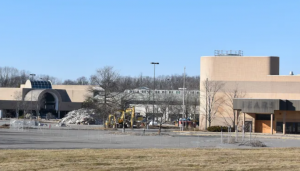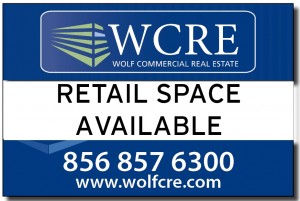
A long-deserted mall here is finally seeing a burst of activity.
But it’s coming from a demolition crew.
Workers are razing the Burlington Center in a months-long project that will smash the Sears store, pulverize JCPenney, and even flatten the food court.
The redevelopment project — expected to make way for distribution centers and retail uses at a 275-acre site — isn’t the only big change coming to a South Jersey mall.
A hotel and some 1,000 apartments are in the works at Moorestown Mall, where an empty Sears store will be converted to medical offices, according to the shopping center’s owner.
And despite a setback for an earlier redevelopment effort, officials in Voorhees are still hoping to find a new use for the former — and fast-fading — Echelon Mall.
Indoor malls once dominated South Jersey’s retail landscape, but that was back when Amazon was the name of a river and shopping from home meant a Tupperware party.
Now, shopping center operators say their properties must find new uses in the face of increased competition from online sellers and the demise of many brick-and-mortar retailers.
And local officials are encouraging the trend by declaring some malls to be redevelopment zones — a step taken in Burlington Township, Moorestown and Voorhees.
With anchor stores going under, PREIT is changing the mix of tenants at properties that include Cherry Hill Mall and Cumberland Mall in Vineland.
“We have been reducing the percentage of traditional mall tenants and increasing the share of space dedicated to dining, entertainment, fast fashion, off price, and large format box tenants,” the Philadelphia-based firm notes in its annual report for 2020.
PREIT announced plans this month for Cooper University Healthcare to occupy more than 165,000 square feet in a former Sears store at Moorestown Mall.
Another closed anchor at the Moorestown complex, Lord + Taylor, is being used for a COVID-19 vaccination center.
Newcomers elsewhere include the mall operator’s first Aldi grocery store in Massachusetts and a 100,000-square-foot family entertainment center in South Carolina, said Joseph Coradino, the firm’s chairman and CEO.
He also noted plans for a 60,000-square-foot self-storage center at a Maryland mall.
“Demand is robust from uses far beyond traditional retail,” Coradino told a recent conference call with investment analysts.
PREIT is eager to put hotels and apartments at suitable malls, most likely in the Philadelphia and Washington, D.C., regions, he said.
Land sales to developers would generate cash for PREIT, and the projects — once new residents and hotel guests arrive — would provide customers for mall merchants, says the annual report.
Meanwhile, mall operators must grapple with chain-store bankruptcies, changing consumer habits and economic upheaval from the pandemic.
PREIT, for instance, restructured its finances last year under bankruptcy protection and this month reported a net loss for 2020 of $286.9 million. The year-long deficit resulted in part from a $148.5 million write-down on the value of PREIT’s premier property, a three-block shopping center known as Fashion District Philadelphia.
Similarly, the Deptford Mall’s owner, The Macerich Co., reported a net loss of $230.2 million last year. That compared to a 2019 profit of $96.8 million for the California firm.
According to the International Council of Shopping Centers, mall occupancy rates fell last year to 88.1 percent — well below the 2016 level of 93.6 percent.
The organization also said retailers are a dwindling presence in one-time shopping palaces. Retailers occupied 65.8 percent of shopping-center space in 2020, down from 73.6 percent in 2014.
In contrast, “non-retail/non-food” tenants took 26 percent of shopping center space in 2020. That was up from 19.5 percent in 2014, the council said.
Voorhees officials in February 2019 described a “framework” to revive the former Echelon Mall with up to 330 homes and new commercial uses.
“The vision may include a microbrewery with a beer garden, wine bar, indoor sports complex and theater,” Mayor Michael Mignogna said at that time.
The extensive makeover, possibly including a 112,000-square-foot hotel, was expected to transform the Somerdale Road mall, which now has an empty Macy’s store and multiple smaller vacancies.
But the designated redeveloper, Brandywine Financial Services Corp., backed off after the pandemic struck last year, said Mario DiNatale, the township’s director of community and economic development.
“Here, as around the world, COVID-19 caused most developers to take pause for any substantial development,” said DiNatale.
He said township officials “have remained in communication” with Brandywine and other potential redevelopers, “but we do not anticipate much progress until business normalcy returns.”
Burlington Township officials spent almost 15 years pursuing redevelopment of Burlington Center, a two-level mall set back from Burlington-Mount Holly Road.
The shopping center was built in 1982 by the Maryland-based Rouse Co., which developed Cherry Hill Mall in 1961 and Echelon Mall in 1969. It closed in January 2018, after losing a steady stream of tenants and then being flooded by burst pipes.
A draft redevelopment plan calls for up to three warehouses or distribution centers with a combined capacity of up to 2 million square feet.
Smaller retails buildings would be clustered on a 40-acre tract.
Allowed uses at the site would include medical facilities, convenience stores, wholesale clubs and “branded full service hotels,” according to the November 2020 draft plan.
Two prospective tenants, including a national fast-food chain, have signed letters of intent to occupy free-standing buildings, according to the leasing agent, Equity Retail Brokers of Plymouth Meeting, Pa.
Homes are to be built later on about 50 acres on the other side of Bromley Boulevard, an area that’s not part of the mall redevelopment area, said Scott Hatfield, the township’s engineer.
The redeveloper — a partnership of MRP Industrial and Clarion Partners — declined to comment on the project. The firms previously built a warehouse complex at the site of a former Hercules Inc. chemical plant in the township.
Earlier efforts to revive the mall site with retail uses, dating back to 2007, “have been thwarted throughout the years,” says a township ordinance that recently established a redevelopment zone there.
Obstacles to redevelopment have included “a proposed hazardous waste incinerator,” extensive wetlands and the need for highway improvements, it said.
But a major hurdle was overcome in 2019 when MRP Industrial told township officials it controlled enough property to redevelop the site “with a mix of uses to include housing, retail and both market-rate and affordable housing.”
Demolition work, expected to end by September, will also remove a former Taylor Rental store and a now-closed Chuck E Cheese restaurant near the mall, said Hatfield.
All of the changes won’t make retail disappear, said Coradino at PREIT, which counts Cherry Hill Mall as the second-most successful shopping center in its 20-mall line-up.
“Business will return in a significant way for retailers, restaurants and entertainment in the brick-and-mortar format,” he said of the post-pandemic era.
“Our plan to diversify our offerings has crystallized over the past year,” said Coradino. “However, retail will remain at the core.”
*Article courtesy of Courier Post Online
For more information about New Jersey or Philadelphia retail space, or other New Jersey and Philadelphia commercial properties, please call 856-857-6300 to speak with Jason Wolf (jason.wolf@wolfcre.com) at Wolf Commercial Real Estate, a leading New Jersey and Philadelphia commercial real estate broker that specializes in both New Jersey and Philadelphia office space, New Jersey and Philadelphia retail space, and New Jersey and Philadelphia industrial space.
Wolf Commercial Real Estate, a full-service CORFAC International brokerage, and advisory firm, is a premier New Jersey and Philadelphia commercial real estate brokerage firm that provides a full range of New Jersey and Philadelphia commercial real estate listings and services, property management services, and marketing commercial offices, medical properties, industrial properties, land properties, retail buildings and other New Jersey and Philadelphia commercial properties for buyers, tenants, investors, and sellers.
A New Jersey and Philadelphia commercial real estate broker with expertise in New Jersey and Philadelphia commercial real estate listings, Wolf Commercial Real Estate provides unparalleled expertise in matching companies and individuals seeking new New Jersey and Philadelphia retail space with the New Jersey and Philadelphia commercial properties that best meets their needs.
As experts in both Philadelphia and New Jersey commercial real estate listings and services, the team at our commercial real estate brokerage firm provides ongoing detailed information about Philadelphia and New Jersey commercial properties to our clients and prospects to help them achieve their real estate goals. If you are looking for New Jersey or Philadelphia office space, Philadelphia or New Jersey retail space, or New Jersey or Philadelphia industrial space for sale or lease, Wolf Commercial Real Estate is the New Jersey and Philadelphia commercial real estate broker you need – a strategic partner who is fully invested in your long-term growth and success.
Please visit our websites for a full listing of South Jersey, Philadelphia, and New Jersey commercial properties for lease or sale through our Philadelphia commercial real estate brokerage firm.


